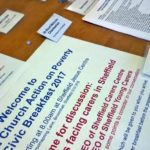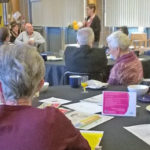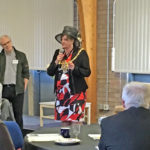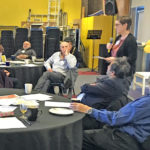Who cares for the carers?
Each year, our local group in Sheffield holds a Civic Breakfast. Sara Millard reports on the 2017 Civic Breakfast held on 9 March, on the theme of challenges facing unpaid carers in Sheffield.
The Civic Breakfast was held at Sheffield Jesus Centre and we welcomed faith leaders, local councillors and colleagues from across health and social care and frontline services.
The Lord Mayor of Sheffield, Councillor Denise Fox, opened our discussions and spoke movingly about her own experience as a carer. Celia Robinson, CEO of Sheffield Carers’ Centre, told us that there are 60,000 carers in the city, with an increasing number of over-85s caring for partners, children, or friends. Their greatest burden is isolation – they can’t be spontaneous about any activity in their own life – and then the costs of heating, diet and transport are a constant worry.
Their working life, and any opportunities for training, may be disrupted or even given up, as their responsibilities mean they have no flexibility around these matters. Carers have some rights if their role is more than 35 hours per week, but it is complicated to prove the criteria needed to be eligible for assistance.
Sara Gowen, CEO of Sheffield Young Carers, informed us that 7,000 of that number are aged 12 years and upwards (although some are as young as 5), which is approximately two children in every classroom. Many view their role as just helping a member of their family, but with 1 in 12 caring for more than 15 hours per week, and 1 in 20 missing some schooling, the result is that they have a lower attainment at GCSE level and earn approximately £5,000 less than the average wage when they find work.
Many say that they would welcome interest by their GP in their role, and concern about them too. Colleges can give training in recovery principles, and Sheffield City Council is responding by working with the Carers’ Centre to develop new services and acknowledging the value of caring. A whole-school assembly can be used to identify some young carers, there is art therapy in primary schools, and an improved strategy of support is being developed.
We heard from two carers amongst those who had been invited: one who is normally cared-for, but there has been a sudden role-reversal, which means that she and her child now care for her husband, and a second cares for her (older) spouse and her mother.
A Civic Breakfast is an easy way to tell stories and build support for local action to tackle poverty. Find out how you could organise one here.








